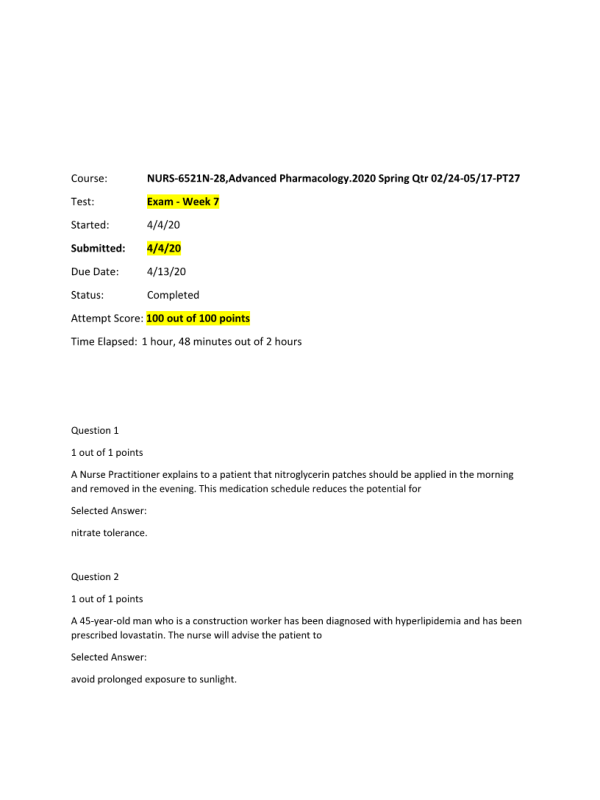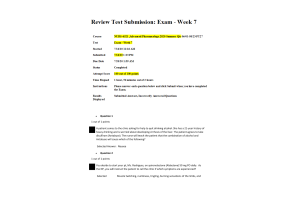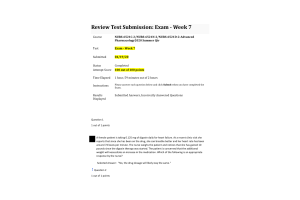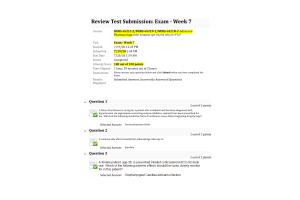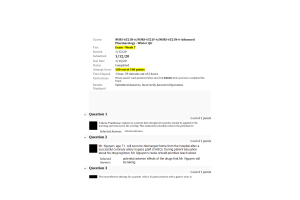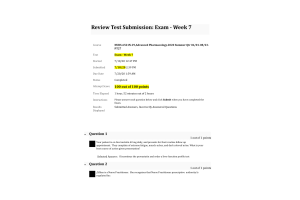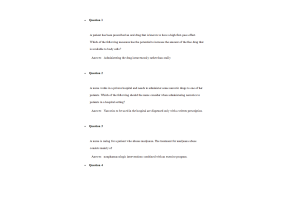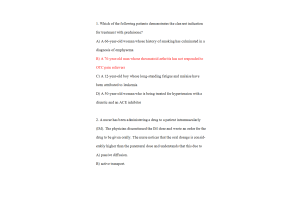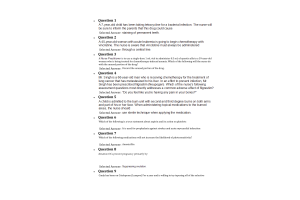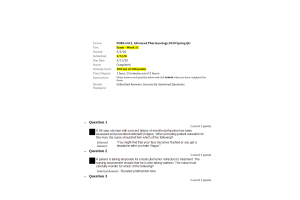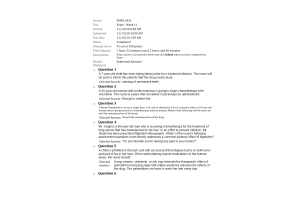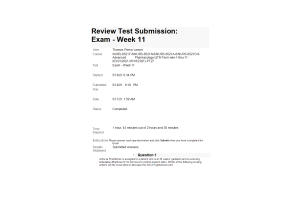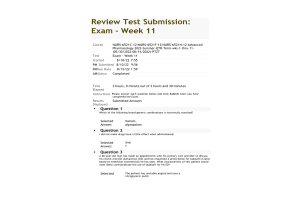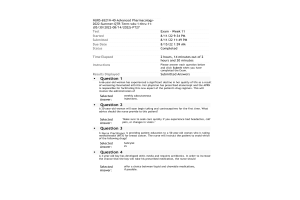NURS 6521N-28, Week 7 Midterm Exam; 100 out of 100 Points
- $49.00
NURS 6521 Advanced Pharmacology
- Question: A Nurse Practitioner explains to a patient that nitroglycerin patches should be applied in the morning and removed in the evening. This medication schedule reduces the potential for:
- Question: A 45-year-old man who is a construction worker has been diagnosed with hyperlipidemia and has been prescribed lovastatin. The nurse will advise the patient to
- Question: The most effective therapy for a patient who is H. pylori positive with a gastric ulcer is:
- Question: A patient with class-IV CHF has a medication regimen consisting of metoprolol (Lopressor), enalapril (Vasotec), and furosemide (Lasix). In addition to regularly assessing the patient s heart rate,the nurse should prioritize assessment of the patient's:
- Question: A 58-year-old man is prescribed dicyclomine (Bentyl) for irritable bowel syndrome. In which of the following conditions is dicyclomine therapy contraindicated?
- Question: A patient is in the clinic for seasonal allergic rhinitis. Loratadine (Claritin) is prescribed. Which of the following statements will the nurse include when providing patient education concerning this drug?
- Question: The APRN is prescribing a medication that is known to induce hepatic enzymes. What effect should you anticipate?
- Question: A patient comes to the clinic asking for help to quit drinking alcohol. She has a 21-year history of heavy drinking and is worried about developing cirrhosis of the liver. The patient agrees to take disulfiram (Antabuse). The nurse will teach the patient that the combination of alcohol and Antabuse will cause which of the following?
- Question: A patient has been prescribed lovastatin for a high cholesterol level. The nurse's teaching plan will include a basic explanation of how the drug produces its therapeutic effect. The nurse will explain that lovastatin lowers cholesterol levels because it
- Question: Which of the following patients is most likely to benefit from the administration of an adrenergic agonist?
- Question: Mr. Nguyen, age 71, will soon be discharged home from the hospital after a successful coronary artery bypass graft (CABG). During patient education about his drug regimen, Mr. Nguyen's nurse should prioritize teach about:
- Question: A 70-year-old man who enjoys good health began taking low-dose aspirin several months ago based on recommendations that he read in a magazine article. During the man's most recent visit to his care provider, routine blood work was ordered and the results indicated an unprecedented rise in the man's serum creatinine and blood urea nitrogen (BUN) levels. How should a nurse best interpret these findings?
- Question: A 62 year old male who had a myocardial infarction one year ago is being seen for hypertension. Which medication has the best evidence in mortality reduction?
- Question: A Nurse Practitioner is providing care for a 71-year-old woman who was sponsored to emigrate from Mexico to the United States 6 months ago. Earlier this week, the woman slipped while getting off a bus and fractured her hip. How should the woman's nurse best exemplify cultural competence in the care of this patient?
- Question: A 77-year-old man's chronic heart failure is being treated with a regimen of quinapril (Accupril) and furosemide (Lasix). Which of the following assessment findings would suggest that the loop diuretic is contributing to a therapeutic effect?
- Question: The Nurse Practitioner's assessment of a community-dwelling adult suggests that the client may have drug allergies that have not been previously documented. What statement by the client would confirm this?
- Question: A Nurse Practitioner is conducting an assessment of a patient who has recently had several changes made to her drug regimen. What assessment question most directly addresses the safety implications of the patient's drug regimen?
- Question: The APRN is treating a 56 year old male with diagnosed atrial fibrillation. He is complaining of being light headed. His vital signs are BP 100/68 HR 144 RR 22. The best choice of medication to treat this patient is:
- Question: A 34-year-old male patient is prescribed methimazole (MMI). The Nurse Practitioner will advise him to report which of the following immediately?
- Question: A patient is admitted to the emergency department with severe chest pain. The emergency department physician orders intravenous nitroglycerin 5 mcg/min, titrate dose by 5 mcg/min every 3 to 5 minutes per infusion pump as needed. Before administering the nitroglycerin, the nurse should prioritize which of the following assessments?
- Question: A 39-year-old African-American male is 25 pounds overweight and has been diagnosed with hypertension after three consecutive above-normal blood pressure readings. The most likely initial drug therapy for this patient will be
- Question: A Nurse Practitioner working for a drug company is involved in phase III drug evaluation studies. Which of the following might the Nurse Practitioner be responsible for during this stage of drug development?
- Question: A Nurse Practitioner is instructing a patient in the administration of regular insulin by the subcutaneous route. Which of the following strategies would the Nurse Practitioner suggest if the goal is to promote absorption of the regular insulin?
- Question: Topical inhaled alpha adrenergic blocking agents or nasal vasoconstricting decongestants should not be used chronically (>5 days) because they can cause
- Question: A 67-year-old man is admitted to the hospital with pneumonia. He reports to the nurse that he has chronic arthritis and circulation problems. Further assessment by the nurse reveals that the patient has a history of mild hypertension. He explains that he owns a business and lives alone. The nurse determines that he is within the normal weight range for his height and age but has a fondness for spicy foods and sweets. Which of the mentioned patient variables will have the greatest impact on the effectiveness of the patient's drug therapy?
- Question: Decongestants are recommended to use in which of the following patients?
- Question: Drugs have a high potential for abuse. There is no routine therapeutic use for these drugs and they are not available for regular use. They may be obtained for "investigational use only" by applying to the U.S. Drug Enforcement Agency. Examples include heroin and LSD. Which scheduled drug is this?
- Question: The Nurse Practitioner is conducting a medication reconciliation of a new resident of a long-term care facility. The Nurse Practitioner notes that the resident takes allopurinol on a daily basis for the treatment of gout. What is the primary purpose of this drug?
- Question: A patient is being treated for respiratory infection. He is a recovering alcoholic and has impaired liver function. The nurse will instruct the patient to be especially cautious when taking
- Question: Which of the following serves to protect the public by ensuring the purity of a drug and its contents?
- Question: After a recent history of shortness of breath that has become increasingly severe, a woman has been prescribed ipratropium by MDI while she undergoes a diagnostic workup. What patient teaching should the nurse provide to this patient?
- Question: A Nurse Practitioner is a member of a research team that is exploring unique differences in responses to drugs that each individual possesses, based on genetic make-up. This area of study is called:
- Question: A Nurse Practitioner who provides care in a busy clinic is aware of the high incidence and prevalence of hyperlipidemia and the consequent need for antihyperlipidemics in many patients. Treatment of high cholesterol using statins would be contraindicated in which of the following patients?
- Question: In order to promote therapeutic drug effects, the Nurse Practitioner should always encourage patients to
- Question: A patient has been prescribed zolpidem (Ambien) for short-term treatment of insomnia. Which of the following will the nurse include in a teaching plan for this patient? (Select all that apply.)
- Question: An expected outcome for a patient who has just taken sublingual nitroglycerin should be
- Question: A patient taking Metformin (Glucophage) is scheduled for a cardiac cath. The patient asks why he can't take his metformin the day of the test. What is the most appropriate reply?
- Question: Which of the following will a Nurse Practitioner inform the patient is one of the most common adverse effects of guaifenesin (Robitussin)?
- Question: A Nurse Practitioner is caring for a 70-year-old patient who is taking desmopressin (DDAVP). The patient has a history of cardiovascular disease. The nurse will prioritize the assessment of which of the following?
- Question: The Nurse Practitioner is prescribing Salmeterol (Serevent) inhaler for a patient with asthma. What instructions would be correct to provide the patient?
- Question: Which of the following patients should be advised by the Nurse Practitioner to avoid over-the-counter cold and allergy preparations that contain phenylephrine?
- Question: A 77-year-old patient has a long-standing history of hypertension, a health problem that is being treated with metoprolol and a thiazide diuretic. Before administering the 8 AM dose of these medications, what assessments should the nurse perform and document? (Select all that apply.)
- Question: The APRN would use what class of medication to manage COPD?
- Question: Mr. Tan is a 69-year-old man who prides himself in maintaining an active lifestyle and a healthy diet that includes adequate fluid intake. However, Mr. Tan states that he has experienced occasional constipation in recent months. What remedy should be the nurse's first suggestion?
- Question: A child with sinusitis has been on antibiotics for seven days and his symptoms are not improving. All of the following are options to prescribe for the patient now EXCEPT:
- Question: A patient with a recent diagnosis of acute renal failure has a long-standing seizure disorder which has been successfully controlled for several years with antiseizure medications. The nurse should recognize that the patient's compromised renal function will likely
- Question: You are seeing a 55 year old patient recently diagnosed with a bleeding ulcer. What should be the initial treatment choice for this patient?
- Question: A 79-year-old patient in a long-term care facility is to receive an intravenous fat emulsion. Which of the following lab values would be a priority for the nurse to assess before administration?
- Question: A patient in need of myocardial infarction prophylaxis has been prescribed sulfinpyrazone for gout. Which of the following will the nurse monitor the patient most closely for?
- Question: A 62-year-old man has been prescribed lovastatin. The Nurse Practitioner will instruct the patient to take the medication
- Question: A Nurse Practitioner is providing patient education to a 35-year-old man who has been prescribed clonidine (Catapres) as part of step 2 antihypertensive therapy. The Nurse Practitioner should anticipate that the drug will be administered
- Question: A 79-year-old woman who takes several medications for a variety of chronic health problems has been prescribed an oral antiplatelet aggregator that is to be taken once daily. The nurse has encouraged the woman to take the pill at the same time of day that she takes some of her other medications. What is the most likely rationale for the nurse's advice?
- Question: John is a newly diagnosed diabetic that contacts the office with complaints of severe nausea and vomiting. What instructions should the APRN provide related to his insulin doses?
- Question: A Nurse Practitioner is providing discharge instructions to a patient who will be taking fludrocortisone at home. The Nurse Practitioner will encourage the patient to eat a diet that is
- Question: A Nurse Practitioner is administering drugs to a 70-year-old patient who has a reduced plasma albumin level. When assessing the patient for therapeutic outcomes of drug therapy, the Nurse Practitioner will also be careful to observe for
- Question: The nurse practitioner orders Amoxicillin 500 mg tid? What is the total amount of medication patient will take per day?
- Question: The APRN's ability to prescribe controlled substances is regulated by:
- Question: Which of the following is TRUE about long acting beta agonist use in asthma patients?
- Question: A Nurse Practitioner who provides care on an acute medicine unit has frequently recommended the use of nicotine replacement gum for patients who express a willingness to quit smoking during their admission or following their discharge. For which of the following patients would nicotine gum be contraindicated?
- Question: A Nurse Practitioner is caring for a male patient who has a diagnosis of coronary artery disease (CAD). His drug therapy includes lovastatin. Because the patient has a history of severe renal disease, the nurse will assess for which of the following?
- Question: A patient has been prescribed a Scheduled 5 drug, an example of this drug is
- Question: A child is prescribed an inhaled corticosteroid agent to decrease respiratory inflammation related to exposure to an animal. The patient’s parent administers a higher than prescribe dose of the medication for 5 days. What should the APRN monitor the child for?
- Question: An older adult who lives in a long-term care facility has recently begun taking losartan (Cozaar) for the treatment of hypertension. The nurse who provides care for this resident should recognize that this change in the resident's medication regimen make create a risk for
- Question: A Nurse Practitioner who is responsible for administering medications should understand that the goals of the MedWatch program are to (Select all that apply.)
- Question: Frequent episodes of exercise-related chest pain have caused a 79-year-old woman to use her prescribed nitroglycerin spray several times in recent weeks. This patient's age will have what effect on her use of nitroglycerin?
- Question: A patient has been admitted to the ICU because of multiple traumas due to a motor vehicle accident. The physician has ordered propofol (Diprivan) to be used for maintenance of sedation. Before administration of propofol, a priority assessment by the nurse would be to check for a history of
- Question: Several months of treatment with a statin accompanied by lifestyle modifications have failed to appreciably improve a patient's cholesterol levels. Consequently, the patient has been prescribed cholestyramine. The nurse should recognize that this drugs achieves its therapeutic effect by
- Question: A Nurse Practitioner who provides care for older adults is aware of the high incidence of drug interactions in this population. When educating a group of seniors about the prevention of drug interactions, the Nurse Practitioner should encourage them to
- Question: Federal legislation dictates a lengthy and rigorous process of testing for new drugs. What is the primary purpose of this testing process?
- Question: A 72-year-old man is prescribed theophylline for symptomatic relief of bronchial asthma. Which of the following findings would alert the nurse to the need for close monitoring?
- Question: A patient is taking cholestyramine. The Nurse Practitioner will assess for which of the following common adverse effects of the drug?
- Question: A 60-year-old African-American man lives with a number of chronic health problems. Genetic factors are likely to influence his etiology and/or treatment of
- Question: A Nurse Practitioner is instructing a patient concerning a newly prescribed drug. Which of the following should be included to help improve patient compliance and safety?
- Question: Which of the following affects drug distribution throughout the body?
- Question: A 20-year-old woman calls the clinic at 5 PM and reports to the Nurse Practitioner that she forgot to take her morning dose of fexofenadine (Allegra). She usually takes her evening dose at 8 PM. She wants to know what she should do. The Nurse Practitioner will instruct her to
- Question: A 48-year-old woman who works as an office manager is prescribed metoclopramide (Reglan) for diabetic gastroparesis. The nurse will be sure to assess the patient for
- Question: During a clinic visit, a patient complains of having frequent muscle cramps in her legs. The nurse's assessment reveals that the patient has been taking over-the-counter laxatives for the past 7 years. The nurse informed the patient that prolonged use of laxatives
- Question: A female patient is taking 0.125 mg of digoxin daily for heart failure. At a recent clinic visit she reports that since she has been on the drug, she can breathe better and her heart rate has been around 74 beats per minute. The nurse weighs the patient and notices that she has gained 10 pounds since the digoxin therapy was started. The patient is concerned that the additional weight will necessitate an increase in the medication. Which of the following is an appropriate response by the nurse?
- Question: A 76-year-old woman has a complex medical history that includes emphysema, osteoporosis, malnutrition, and hypothyroidism. Recently, the woman fell outside her home as a result of weakness and suffered a fracture to her femoral head. The woman's subsequent hip-replacement surgery has been scheduled and the care team recognizes that the use of isoflurane will be most significantly influenced by
- Question: A clinic Nurse Practitioner has been assigned a 49-year-old female patient who has a history of diabetes. A recent diagnosis of hypertension has been made, and the patient has been prescribed a thiazide diuretic and labetalol. The patient will be scheduled to return to the clinic once a month for the next 6 months. A priority action by the Nurse Practitioner will be to
- Question: A 46-year-old white American has been prescribed a drug that binds to acid glycoproteins. The nurse understands that white Americans usually receive
- Question: A home health Nurse Practitioner is performing a home visit to an elderly client who has early-stage dementia. The Nurse Practitioner observes that some of the client's pill bottles are empty, even though the client is not due for refills for 2 weeks. What nursing diagnosis should the Nurse Practitioner prioritize when planning this client's care?
- Question: A 55-year-old man's hypertension has not responded adequately to his current medication regimen consisting or an ACE inhibitor, a beta-blocker and a thiazide diuretic. As a result, he will soon begin taking hydralazine (Apresoline) in addition to his existing antihypertensives. The addition of this medication to his regimen means that the nurse must prioritize which of the following nursing actions?
- Question: A teenage boy has undergone a diagnostic workup following several months of persistent, bloody diarrhea that appears to lack an infectious etiology. The boy has also experienced intermittent abdominal pain and has lost almost 15 pounds this year. Which of the following medications is most likely to treat this boy's diagnosis?
- Question: A patient has GERD and is taking ranitidine (Zantac). She continues to have gastric discomfort and asks whether she can take an antacid. Which of the following is an appropriate response by the nurse?
- Question: To maximize the therapeutic effect of diphenoxylate HCl with atropine sulfate, the nurse will instruct the patient to take the medication
- Question: The Nurse Practitioner is performing patient education for a woman who will soon begin treatment of hyperlipidemia with simvastatin (Zocor). The patient has asked the Nurse Practitioner if there are any "bad side effects" that she should be aware of. Which of the following statements should underlie the nurse's response?
- Question: A man who smokes one pack of cigarettes daily has been diagnosed with chronic bronchitis. He has been prescribed theophylline by his family doctor. What effect will the patient's smoking status have on the therapeutic use of theophylline?
- Question: A 58-year-old man is admitted to the emergency department. A diagnosis of severe digoxin toxicity is made. Bradycardia is present, and an electrocardiogram (ECG) confirms toxicity. The nurse will administer which of the following drugs?
- Question: It is determined that a patient, who is in a hepatic coma, needs a laxative. Lactulose is prescribed. Which of the following should the nurse monitor to assess the efficacy of the lactulose therapy?
- Question: A Nurse Practitioner is providing a patient with a list of drugs as a part of the patient's plan of care. Which of the following drug nomenclatures should the Nurse Practitioner use to list the drugs?
- Question: A homeless man who is well known to care providers at the local hospital has been admitted to the emergency department after having a seizure outside a mall. The man is known to be a heavy alcohol user and is malnourished with a very low body mass index. How are this patient's characteristics likely to influence possible treatment with phenytoin?
- Question: A Nurse Practitioner is providing discharge planning for a 45-year-old woman who has a prescription for oral albuterol. The Nurse Practitioner will question the patient about her intake of which of the following?
- Question: A Nurse Practitioner is caring for a 73-year-old man who is receiving drug therapy. He is beginning to exhibit signs of decline in his renal system, yet his current serum creatinine level is normal. The Nurse Practitioner will base the patient's plan of care on the understanding that there is
- Question: A female patient has been taking prednisone for her asthma for 1 month. The nurse will teach her to gradually decrease her dose of prednisone to avoid
- Question: A 72-year-old man is taking Adderall XR for the treatment of narcolepsy. He is currently having problems with not being able to swallow large tablets or capsules. The man also wears dentures, which makes it even more difficult for him to swallow medication. He is in the clinic to talk to the nurse about his problem. The nurse will instruct him to
- Question: Mrs. Houston is a 78-year-old woman who resides in an assisted living facility. Her doctor prescribed digoxin at her last visit to the clinic and she has approached the nurse who makes regular visits to the assisted-living facility about this new drug. What teaching point should the nurse emphasize to Mrs. Houston?
- Question: A patient with bronchial asthma is prescribed a sustained-release preparation of theophylline. To help minimize the adverse effects of the drug, which of the following should the nurse suggest?
- Question: A Nurse Practitioner is teaching a patient about his newly prescribed drug, colchicine, for gout. The Nurse Practitioner will instruct the patient to avoid which of the following foods?
- Question: What critical piece of information is missing from the following medication order: Amoxicillin 250 mg every 8 hours?
- Question: When completing this exam, did you comply with Walden University’s Code of Conduct including the expectations for academic integrity?
